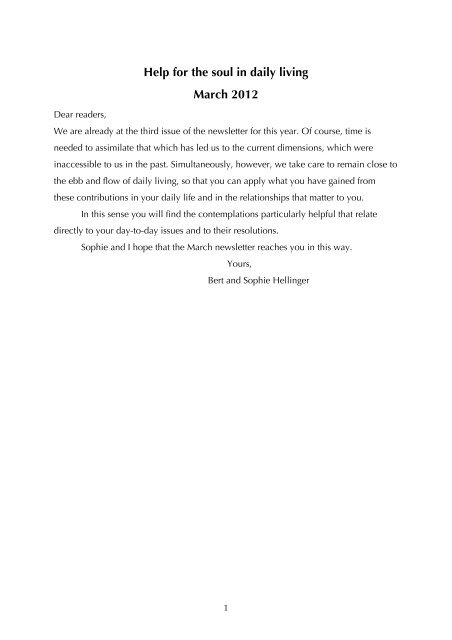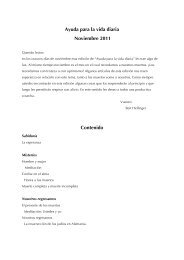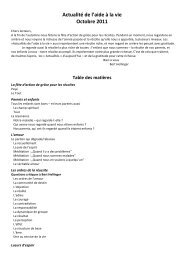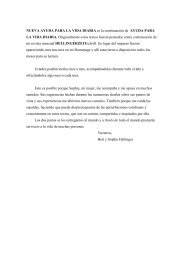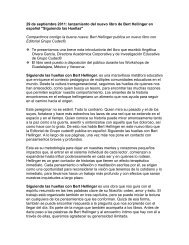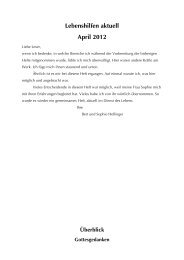To open the whole Monthly Letter as a PDF, please ... - Bert Hellinger
To open the whole Monthly Letter as a PDF, please ... - Bert Hellinger
To open the whole Monthly Letter as a PDF, please ... - Bert Hellinger
- No tags were found...
You also want an ePaper? Increase the reach of your titles
YUMPU automatically turns print PDFs into web optimized ePapers that Google loves.
Help for <strong>the</strong> soul in daily livingMarch 2012Dear readers,We are already at <strong>the</strong> third issue of <strong>the</strong> newsletter for this year. Of course, time isneeded to <strong>as</strong>similate that which h<strong>as</strong> led us to <strong>the</strong> current dimensions, which wereinaccessible to us in <strong>the</strong> p<strong>as</strong>t. Simultaneously, however, we take care to remain close to<strong>the</strong> ebb and flow of daily living, so that you can apply what you have gained from<strong>the</strong>se contributions in your daily life and in <strong>the</strong> relationships that matter to you.In this sense you will find <strong>the</strong> contemplations particularly helpful that relatedirectly to your day-to-day issues and to <strong>the</strong>ir resolutions.Sophie and I hope that <strong>the</strong> March newsletter reaches you in this way.Yours,<strong>Bert</strong> and Sophie <strong>Hellinger</strong>1
OverviewAno<strong>the</strong>r way of seeingOpen eyes 3Steps 4The path 4We 5Our daily lifeHelpful letters 7Treats 10The cycle 10Life and death 10Circulation and love 11Circulation and death 12Obstacles 12The creative perception 13Example 13Exercise: The good perception 14Extr<strong>as</strong>The spiritual family constellations 14The spiritual consciousness 14Whose consciousness? 15Unison with <strong>the</strong> spirit 16Peace 17Peace, what does this mean? 17What does peace achieve? 17Peace begins in one’s own soul 18Peace continues in one’s own family 182
Peace faces conflicts 19Peace is never completed 19Peace is primarily threatened by groups 19<strong>Letter</strong>s that touch <strong>the</strong> heart 21Seeing and hearing 21Experience and thinking 21Ano<strong>the</strong>r way of seeingOpen eyesSome think <strong>the</strong>y are collected more deeply when <strong>the</strong>y close <strong>the</strong>ir eyes. Yet amongBuddhists it is a common practice to keep one’s eyes slightly <strong>open</strong>. This producesano<strong>the</strong>r way of recollection than with closed eyes.We can test <strong>the</strong> difference in ourselves. With fully closed eyes we run <strong>the</strong> risk ofbeing flooded by our own inner images, so that in <strong>the</strong> end we are scattered ra<strong>the</strong>r thancollected.With our eyes half <strong>open</strong> we remain connected to outer surroundings, and yet wedo not get lost in <strong>the</strong>m. We remain collected, towards inside and towards outside,without focussing on anything. Everything is just <strong>the</strong>re, toge<strong>the</strong>r with everything else,and this includes us.This is how you can read many contributions in this issue. You have <strong>the</strong>m beforeyou, without looking at <strong>the</strong>m too closely. At <strong>the</strong> same time you remain collected inside,here too, without losing yourselves in anything particular – not even in an emptiness.In this contemplation our vision is without focus, nei<strong>the</strong>r towards inside noroutside.Sometimes we see people with <strong>the</strong>ir eyes <strong>open</strong>, and yet <strong>the</strong>y don’t see. Then wesay: “You are sleeping with <strong>open</strong> eyes!” But, in truth, <strong>the</strong>y are nei<strong>the</strong>r sleeping nordreaming, <strong>the</strong>y are present somewhere else, completely <strong>the</strong>re.What I am describing here we can also experience in our daily life. Are we less<strong>the</strong>n, or are we more?So, let’s try it out, being <strong>the</strong>re and not being <strong>the</strong>re, at <strong>the</strong> same time.3
What do we experience <strong>the</strong>n? We experience ano<strong>the</strong>r fullness, a wakefulfullness, without focussing on anything. We are precise in an imprecise way. We aremany things at once, in accord with one thing <strong>as</strong> well <strong>as</strong> with ano<strong>the</strong>r. We areembedded and in motion, fully <strong>the</strong>re with everything.StepsAs a rule, steps lead upwards. They begin below. Often <strong>the</strong>y are still wide at <strong>the</strong>beginning. The higher we climb, <strong>the</strong> narrower <strong>the</strong>y become, until in <strong>the</strong> end <strong>the</strong>re isonly room for one person. Right at <strong>the</strong> top we stand alone.Of which steps did I speak? Of <strong>the</strong> steps of insight. They begin on <strong>the</strong> groundand <strong>the</strong>re <strong>the</strong>y have a lot of room for many. The higher <strong>the</strong>y lead, <strong>the</strong> fewer climbers<strong>the</strong>y can accommodate, until high up we only walk with a few o<strong>the</strong>rs, and finally weare alone. Alone to <strong>the</strong> right and alone to <strong>the</strong> left, but wide <strong>open</strong> for greater heights andeverything that lies ahead.Arrived at <strong>the</strong> top, we no longer walk ourselves. We leave our body behind. Acreative power is taking us along into ano<strong>the</strong>r height and into ano<strong>the</strong>r space … into atimeless space, into an eternal now.I described this path of insight a long time ago, in a poem.The pathA son went home to see his old fa<strong>the</strong>rand <strong>as</strong>ked of him:“Fa<strong>the</strong>r bless me, before you leave!”The fa<strong>the</strong>r said: “My blessing shall be,I’ll walk with you a little whilealong <strong>the</strong> path of knowledge .”The next morning <strong>the</strong>y stepped out into <strong>the</strong> <strong>open</strong>,and from <strong>the</strong>ir narrow valley<strong>the</strong>y climbed up high onto a mountain.4
The day w<strong>as</strong> already getting old<strong>as</strong> <strong>the</strong>y reached <strong>the</strong> height,but now, <strong>as</strong> far <strong>as</strong> <strong>the</strong> horizon,<strong>the</strong> land lay in its l<strong>as</strong>t light.The sun sank,And with it, all its splendor:Night fell.But in <strong>the</strong> darkness,The stars began to shine.Is this path ended in this night? Or w<strong>as</strong> it just a preparation? In this night of <strong>the</strong> spirit,does something hi<strong>the</strong>rto inaccessible come towards us? Does it take hold of us mostdeeply? Are even <strong>the</strong> stars just a step on <strong>the</strong> ladder, a foreground for something ultimatebehind all existence, for an infinite consciousness?Before this ultimate we become still, infinitely still, infinitely <strong>the</strong>re and not <strong>the</strong>re,timelessly <strong>the</strong>re, eternally <strong>the</strong>re.Does this consciousness have content? Or is it empty? In this consciousness, arewe empty too?The question is: Do we also return from it? Do we have to return?When we find our way back from <strong>the</strong>re, are we still <strong>the</strong> same? Do we still want <strong>the</strong>same? Or have we become devoid of will, taken in by ano<strong>the</strong>r will, by ano<strong>the</strong>rconsciousness? Do we go back to <strong>the</strong> lowest step? Or do we stay up high?We remain on all steps at once, but inconspicuously so. We are at home ineverything, held in everything, for we are elsewhere.How? Open, endlessly <strong>open</strong>.WeWhen we say We, we want to express: We belong toge<strong>the</strong>r. We, man and woman saythis of <strong>the</strong>mselves, when <strong>the</strong>y have become a couple: We belong toge<strong>the</strong>r. We belongtoge<strong>the</strong>r until death parts us.5
In an even deeper way parents and children belong toge<strong>the</strong>r. In <strong>the</strong> children<strong>the</strong>ir parents became inseparable <strong>as</strong> one flesh.In <strong>the</strong> same way everything in nature appears to belong toge<strong>the</strong>r. Everythingappears to be mutually interrelated, similar to us in our relationships <strong>as</strong> humans and ina community of fate.Here I pause, for I wonder: What about par<strong>as</strong>ites, for instance, such <strong>as</strong> atapeworm?Is <strong>the</strong> worm and its host a We like described above? Does <strong>the</strong> tapeworm harm itshost? Does it endanger <strong>the</strong> host’s health and even his or her life, without serving <strong>the</strong>host? Do <strong>the</strong> bloodsuckers live on <strong>the</strong>ir own life, or do <strong>the</strong>y live on <strong>the</strong> blood of o<strong>the</strong>rcreatures, without considering <strong>the</strong>m at all, not being able or allowed to consider <strong>the</strong>m,for such concern would be <strong>the</strong> end of <strong>the</strong>ir own life?So <strong>the</strong> We is two-faced. It h<strong>as</strong> <strong>the</strong> face of a loving connection and also <strong>the</strong> faceof ruthless aggressors, who only care about <strong>the</strong>ir own life.When ano<strong>the</strong>r life approaches us in this way, be it in nature, be it in humanrelationships, <strong>as</strong> an exploiter, for instance, we <strong>as</strong>k, how can we protect ourselves?Often we only realize quite late, at times too late, who h<strong>as</strong> been attacking or infestingus, who is threatening our health or even our life.The question is: How do we deal with <strong>the</strong>se vampires? How do we saveourselves from <strong>the</strong>m? How can we protect ourselves? Shall we do battle with <strong>the</strong>m?Shall we behave like vampires ourselves, just with <strong>the</strong> difference that we only want toget rid of <strong>the</strong>m, not feed of <strong>the</strong>m?Well, I got myself caught in contradictions now. Is <strong>the</strong>re a good solution for bothsides on <strong>the</strong> level of me and you? Does one have to go so that <strong>the</strong> o<strong>the</strong>r can stay? Arenot many wars fought following exactly this pattern, with <strong>the</strong> will to annihilate on bothsides?Where did I end up in this? W<strong>as</strong> I also a vampire, only thinking of my ownadvantage? Am I at all different?Thinking of this is painful. Is <strong>the</strong>re a solution in our world? Where can and mustwe turn to eschew such a fate, no matter <strong>the</strong> side we take?6
We keep vampirism at bay in ourselves. How? We set limits to it, and we onlygo <strong>as</strong> far <strong>as</strong> taking what we need to survive. We do this in agriculture, for instance, orin raising animals, and anywhere else where we exploit nature and <strong>the</strong> earth in adestructive way, with no thought of her and our survival.How do we find a way back to a full Us? How do we find a way into harmonywith <strong>the</strong> movement that wants both sides at once, that is equally at work in both?Within our present consciousness it is hardly conceivable for us. Within ourpresent consciousness, we are far too strongly exposed to <strong>the</strong> oppositions of better orworse, of high and low, of innocence and guilt.The o<strong>the</strong>r We-consciousness does away with <strong>the</strong>se oppositions, and with <strong>the</strong>many so-called knowledge of good and bad.When this distinction is done away with we return to <strong>the</strong> innocence of paradise,to <strong>the</strong> innocence where no I existed, but only We.Earlier on, humans did not know <strong>the</strong> distinction between man and woman. Onlyupon <strong>the</strong>ir so-called knowing did <strong>the</strong>y experience <strong>the</strong>mselves <strong>as</strong> naked and felt<strong>as</strong>hamed.These are images, but behind <strong>the</strong>m a deep truth shows up -- about our originand also about <strong>the</strong> path of <strong>the</strong> all-embracing consciousness that awaits us. It is ano<strong>the</strong>rconsciousness of “We.” In this We two circles become congruent.Our daily lifeHelpful letters6.3.07It is quite a lot what you expect of me in a few sentences. But I have a suggestion foryou. Instead of expecting it from me, expect it from your mo<strong>the</strong>r.10.3.07It took some time for me to be able to reply to your letter. Ple<strong>as</strong>e accept my apologiesfor <strong>the</strong> delay. I watched your constellation once more so that I could respond to you indetail. As you saw in <strong>the</strong> constellation, I rely on <strong>the</strong> movements of <strong>the</strong> representatives7
in practically everything. They bring something to light that wants to be looked at by<strong>the</strong> family. What a constellation shows is one thing. What I say about it, is ano<strong>the</strong>r.What I say about it one can clearly question, <strong>as</strong> you do. From my side, my commentsare ra<strong>the</strong>r suggestions to look in a certain direction, not more. Therefore I will notdefend such comments. From what you tell me, it becomes clear that some of mypresumptions do not apply. Therefore I take <strong>the</strong>m back. But I will return to <strong>the</strong>constellation once more, to point out <strong>the</strong> following matters.1. <strong>To</strong> begin with, I placed three people: representatives for <strong>the</strong> business, for your olderbro<strong>the</strong>r, and for you. The representative for your older bro<strong>the</strong>r stood with his backturned to your representative. Between him and <strong>the</strong> business one could see a friendlyand trusted relationship. Both felt good about each o<strong>the</strong>r. And your representative, too,replied to my question <strong>as</strong> to how he w<strong>as</strong> feeling with: “I feel good.”2. When a representative for your fa<strong>the</strong>r w<strong>as</strong> added, he stood with his back to <strong>the</strong>business, opposite his two sons.He stood <strong>the</strong>re like someone who feels big and strong. But it showed that <strong>the</strong> businessdid not like him. The representative of <strong>the</strong> business looked elsewhere, and aggressively,that is, he clenched his fist. This led to <strong>the</strong> question: Which person who h<strong>as</strong> rights hereis excluded? The representative of <strong>the</strong> fa<strong>the</strong>r said: “Something should be moving here,but nothing is moving.” When I placed <strong>the</strong> fa<strong>the</strong>r’s representative opposite <strong>the</strong> business,both looked to <strong>the</strong> ground. Then <strong>the</strong> fa<strong>the</strong>r’s representative took <strong>the</strong> business by <strong>the</strong>hand, but <strong>the</strong> business resisted.3. The question came up whe<strong>the</strong>r some money from a woman had gone towards <strong>the</strong>business. Therefore I placed female representative without defining whom sherepresented. The representative of <strong>the</strong> business became weak in her presence, and heleaned, even threw himself, on her, and she held him like a child. My conclusion w<strong>as</strong>:The business is hers, <strong>the</strong> business wants to be with her, because it belongs to her. Thewoman reached her hand out <strong>as</strong> if <strong>the</strong>re w<strong>as</strong> someone else who should also beincluded. Then I chose a man <strong>as</strong> a representative and I placed him in front of <strong>the</strong>8
woman and <strong>the</strong> business. The woman led <strong>the</strong> business to this man who had his armswide <strong>open</strong> for <strong>the</strong> business to come, and <strong>the</strong>n <strong>the</strong> woman stood behind <strong>the</strong> man. When<strong>the</strong> representative of <strong>the</strong> fa<strong>the</strong>r wanted to step in between, in front of <strong>the</strong> business, thisman pushed him <strong>as</strong>ide. Then <strong>the</strong> fa<strong>the</strong>r shook his head <strong>as</strong> if to say he w<strong>as</strong> unable to doanything here. When I <strong>as</strong>ked you, you interpreted <strong>the</strong> situation <strong>as</strong> <strong>the</strong> woman being <strong>the</strong>fa<strong>the</strong>r’s mo<strong>the</strong>r, and <strong>the</strong> o<strong>the</strong>r man <strong>the</strong> fa<strong>the</strong>r’s younger bro<strong>the</strong>r. But this w<strong>as</strong> notconclusive from <strong>the</strong> constellation. For me it remained <strong>open</strong>. My only conclusion w<strong>as</strong>that <strong>the</strong> money had been acquired wrongfully; where it came from remained <strong>open</strong> forme. Here I said that something like this could have something to do with Jews. In <strong>the</strong>end <strong>the</strong> business laid down on <strong>the</strong> floor. The o<strong>the</strong>r man w<strong>as</strong> still standing <strong>the</strong>re with<strong>open</strong> arms and clenched fists. When I <strong>as</strong>ked your representative how he felt he said: “Ifeel good. I am exonerated, this h<strong>as</strong> nothing to do with me.” Your older bro<strong>the</strong>r said: “Iam drawn to <strong>the</strong> fa<strong>the</strong>r.” There I discontinued <strong>the</strong> constellation.I said to you: “I have clarified something for you.” When you said: “It is not quite clearto me yet.” I said: “There is a secret that you don’t know. I set something in motion inyour soul. You have seen something that you did not think of. The behavior of yourrepresentative is quite clear, he felt quite relieved that this came to light.” Then Iturned your representative away and I <strong>as</strong>ked him how he felts about that. He said: “Itfeels right.”This w<strong>as</strong> <strong>the</strong> solution <strong>as</strong> it showed up in <strong>the</strong> constellation. When you <strong>as</strong>ked me at <strong>the</strong>end of <strong>the</strong> day what you should do, it w<strong>as</strong>, of course, clear to me that you can’t just getout. The responsibility you have for <strong>the</strong> business and for <strong>the</strong> employees is far too greatfor that. Therefore, I gave you a sentence to take home, a sentence with severalmeanings, that relates to what w<strong>as</strong> shown in <strong>the</strong> constellation and also to your presentsituation and your responsibility: “I will do it well.”In this sense, I wish for you and your business that everything can be turnedaround for <strong>the</strong> better, for all involved.3.4.089
Agree to <strong>the</strong> farewell, <strong>the</strong> way it h<strong>as</strong> become unavoidable for you. You succeed in thisagreeing when you take all <strong>the</strong> beauty from your shared time along with you, into yourfuture. Then re-orientate yourself anew.TreatsEnough is for now.The new surprises.Unprepared we remain spontaneous.What is <strong>the</strong>re, never comes too late.It will always continue on. The question is: What?The cycle(From <strong>the</strong> course in Rome, January 2009)I will say something about something harmless. I’ll say something about <strong>the</strong> cycle.Everything that moves, moves in a circle. Everything that moves is in a cyclicmovement. Moving in this circle, it takes o<strong>the</strong>rs into this cycle <strong>as</strong> well. So, one cyclegives rise to ano<strong>the</strong>r.Take our blood circulation, for instance. We are alive because we move througha circulation of blood. Where blood does not flow any more, life cannot flow ei<strong>the</strong>r.The blood circulation presupposes ano<strong>the</strong>r circulation, that of inhaling andexhaling. Without this circulation life ends immediately, including <strong>the</strong> bloodcirculation, <strong>as</strong> it depends on <strong>the</strong> circulation of breathing in and out.Life and deathThe same goes for our life. Our life in <strong>the</strong> light of day began with our birth, with ourfirst breath, and it ends with our l<strong>as</strong>t breath.At le<strong>as</strong>t, so it appears. For perhaps our death is <strong>the</strong> beginning of ano<strong>the</strong>rcirculation that is hidden from us.Can you still listen? Is this not <strong>the</strong>oretical, all of this?After confirmation from <strong>the</strong> group: Just wait a little longer. Now I will get to <strong>the</strong> point.10
Circulation and loveA relationship is a circulation. When I enter into contact with someone, I sendsomething to this person. I brea<strong>the</strong> something out towards <strong>the</strong> o<strong>the</strong>r. What I brea<strong>the</strong>out, <strong>the</strong> o<strong>the</strong>r brea<strong>the</strong>s in, and it affects something in <strong>the</strong> o<strong>the</strong>r.Now <strong>the</strong> o<strong>the</strong>r brea<strong>the</strong>s it out again in a changed form, and I brea<strong>the</strong> it in. Sothis is <strong>the</strong> cycle of breathing in and out.What matters above all for our breathing in <strong>the</strong> usual sense, when we arebreathing in air? The freshness of <strong>the</strong> air matters, <strong>the</strong> richness in oxygen. This alonekeeps our circulation going.What is <strong>the</strong> freshness in a relationship? The good thoughts. This is <strong>the</strong> fresh airfor any relationship.Now I have arrived at what I want to bring to your attention. The fresh air in arelationship is love, <strong>the</strong> thoughts of love. When I have good thoughts in <strong>the</strong> love for <strong>the</strong>o<strong>the</strong>r person and I brea<strong>the</strong> <strong>the</strong>m out in this person’s direction, <strong>the</strong>n <strong>the</strong> o<strong>the</strong>r brea<strong>the</strong>smy good thoughts in, and <strong>the</strong>y effect something in <strong>the</strong> o<strong>the</strong>r. His or her life circulationchanges. Through my good thoughts <strong>the</strong> o<strong>the</strong>r becomes rich and alive.The love I brea<strong>the</strong>d out and <strong>the</strong> o<strong>the</strong>r brea<strong>the</strong>d in, becomes more in <strong>the</strong> o<strong>the</strong>r. Itbecomes richer. Then <strong>the</strong> o<strong>the</strong>r brea<strong>the</strong>s it out to me, I brea<strong>the</strong> it in, and I becomehappy. This love makes me happy. I feel alive. Love becomes richer in me, and Ibrea<strong>the</strong> it out again. It turns into a continuous circulation of giving and taking love.It turns into a living relationship in which both enrich each o<strong>the</strong>r. Both becomemore alive, both are more connected with <strong>the</strong>mselves and with <strong>the</strong> o<strong>the</strong>r.Circulation and deathAre you still with me? For I must only speak for seven minutes. After seven minutesnobody is listening to me any more. Can you still listen for a few more minutes?Confirmation from <strong>the</strong> group11
What happens when I brea<strong>the</strong> in bad air, for instance, when I harbor bad thoughtsabout <strong>the</strong> o<strong>the</strong>r? Eventually I brea<strong>the</strong> <strong>the</strong>m out. Breathing in my bad thoughts, <strong>the</strong> o<strong>the</strong>rnotices it instantly. What effect does this have on <strong>the</strong> o<strong>the</strong>r? Does he still get enoughair? Can he stay alive? But he gives it back to me. He gives it back to me a bit worsestill. I brea<strong>the</strong> it in. The thoughts get worse in me. I brea<strong>the</strong> <strong>the</strong>m out again. What is <strong>the</strong>result? A movement towards death.All conflicts and all illnesses begin with bad thoughts. These thoughts above alloppose life. For living is loving. More love is more life.Now it is important that we learn to have good thoughts and to perceive <strong>the</strong>o<strong>the</strong>r well in relationship to ourselves, to perceive <strong>the</strong> o<strong>the</strong>r <strong>as</strong> good.ObstaclesWhat hinders <strong>the</strong> good perception? The images we form of <strong>the</strong> o<strong>the</strong>r. Here we learn,step by step, to let go of <strong>the</strong> images that we form about o<strong>the</strong>rs, our images of ourmo<strong>the</strong>r, for instance. Have we ever perceived her? Or about our fa<strong>the</strong>r, or about ourchildren? Have we ever perceived <strong>the</strong>m? And about our partner? Have we alreadyperceived our partner?The creative perceptionI will say something about this perception. When we speak of perception, we usuallythink and say, we have perceived something. This means, we have perceivedsomething that exists.What we perceive with our good perception is not yet in existence. It is acreative perception. It comes from a movement of <strong>the</strong> spirit. What does it mean, insightof <strong>the</strong> spirit? What does spirit cognize? It cognizes something that is still to come, thatdoes not exist <strong>as</strong> yet. When I perceive ano<strong>the</strong>r well, I perceive what will become of thisperson. This is a creative perception. It brings something about that is not yet inexistence. This perception always comes from a movement of love, of love for what itstill is in <strong>the</strong> process of becoming.12
ExampleI will give you an example. As I w<strong>as</strong> sitting here, I had time. I practiced goodperception inside myself, and doing so, I thought about <strong>the</strong> conflict between <strong>the</strong> Israelisand <strong>the</strong> Palestinians.I perceived <strong>the</strong> Israelis well, and I perceived <strong>the</strong> Palestinians well. A sentence for<strong>the</strong> Israelis came to me that creatively guided everything towards a good outcome, andano<strong>the</strong>r sentence came for <strong>the</strong> Palestinians that turns everything around for <strong>the</strong> betterfor <strong>the</strong>m. These sentences come from movements of <strong>the</strong> spirit. They have an effect forall, for <strong>the</strong> Israelis and for <strong>the</strong> Palestinians.Shall I tell you <strong>the</strong> two sentences?Confirmation from <strong>the</strong> groupThe Israelis say to <strong>the</strong> Palestinians: We are leaving. The Palestinians say to <strong>the</strong> Israelis:We wait.Can you sense <strong>the</strong> creative power in <strong>the</strong>se two short sentences? When we practiceour skills in this kind of perception miracles happen all of a sudden.Exercise: The good perceptionNow just close your eyes. Let us practice this inside, practicing <strong>the</strong> good thoughts, andseeing immediately what effect <strong>the</strong>y have.We look at our partner. What inner images do we have of him or of her? Whateffect do <strong>the</strong>se images have on us? What do <strong>the</strong>y do to our relationship?Now we let <strong>the</strong>se images p<strong>as</strong>s in front of us, <strong>as</strong> if it were a movie, but in f<strong>as</strong>tforward, f<strong>as</strong>ter and f<strong>as</strong>ter. When <strong>the</strong> film is finished, we rewind it, and we also do thisf<strong>as</strong>ter and f<strong>as</strong>ter. What remains of <strong>the</strong>ses images?Now we put <strong>the</strong> film <strong>as</strong>ide, we put it away forever, and we look into our partner’seyes, with love. When we feel connected in a new way, we wait for a word and <strong>as</strong>entence from <strong>the</strong> depth of our soul to reach our heart. This word and sentence that13
will make our partner happy, most deeply happy, when he or she hears it. We wait alittle longer, and <strong>the</strong>n we say it to him or her, and we are happy about <strong>the</strong> effect.Extr<strong>as</strong>The spiritual family constellationsWhat does it mean, spiritual family constellations? In recent years my wife Sophie and Ihave ga<strong>the</strong>red more and more experiences in this kind of work, and it becomes clearerand clearer to us, that we are dealing with a sphere of its own, beyond what we canoffer <strong>as</strong> learning in <strong>the</strong> usual sense. Here we are dealing with inner growth that goesbeyond what we can usually learn. The spiritual family constellations constitute <strong>the</strong>high school of family constellations.The spiritual consciousnessIn our body we experience ourselves in a physical way. But everything that goes on inour body is directed by a consciousness. O<strong>the</strong>rwise <strong>the</strong>y could not all work toge<strong>the</strong>r insuch an amazing way. The question is: Whose consciousness is at work in our body? Isit our consciousness? Can it be ours? Most processes have already happened before webecome aware of <strong>the</strong>m and of ourselves. Something takes place here that is consciousand directs us consciously: A greater consciousness.When we think this through fur<strong>the</strong>r: How is it possible that we know our p<strong>as</strong>t,that we can know anything at all about our p<strong>as</strong>t? Is this physical? Can it be physical?Or is <strong>the</strong>re something else at work, ano<strong>the</strong>r consciousness in which we participate? Is itsomething spiritual that is at work here?Fur<strong>the</strong>rmore, how is it possible that we can look into <strong>the</strong> future? How can weplan something for <strong>the</strong> future and prepare ourselves for it? We can only do this throughparticipation in something spiritual, in a greater consciousness.14
And one more observation. How can we be in contact with <strong>the</strong> far<strong>the</strong>st galaxiesthrough our own consciousness? Can an animal do that? How is it that we can do this?Because we participate in something spiritual.The next question is: Can this spiritual be dependent on us, on ourconsciousness? Or w<strong>as</strong> this spiritual here before us, and can it still be here after us?Being connected to something spiritual, we are connected with a greater consciousnessthat transcends our by far.How is it possible, for instance, that we can be in immediate contact with o<strong>the</strong>rpeople through time and space, so that we know how <strong>the</strong>y are? Can this be physical?We constantly see in family constellations that representatives can suddenly be incontact with something about which <strong>the</strong>y didn’t know anything. Does this not showthat a greater consciousness is at work here?Whose consciousness?This consciousness must belong to someone. There can’t just be a free-floatingconsciousness, <strong>as</strong> little <strong>as</strong> <strong>the</strong>re can be a knowing field. A field cannot know anything.This consciousness is alive. It is something in motion that h<strong>as</strong> this consciousness.The great philosophers, Aristotle above all, have thought about this: What is <strong>the</strong>spirit? What is our spirit? How is it that our spirit can cognize something? Is <strong>the</strong>reano<strong>the</strong>r spirit behind everything that is, ano<strong>the</strong>r consciousness that sets everything <strong>the</strong>reis in motion? Nothing can move out of its own accord. All movement comes from apower that is outside of it. This power moves everything. In this connection Aristotlespoke of a first mover.But let us imagine this. Is something <strong>the</strong>re first that is given movementafterwards? This is not conceivable. Everything that moves must be brought intoexistence by something, so that it does move. So how does it come into existence andreceive its motion? How can <strong>the</strong> first mover move it? By thinking it. We can reflectabout this ultimate authority, that is, this spirit. This mind -- called “nous” in Greek --thinks. Everything comes into being because this spirit thinks it, and everything that15
comes into being moves. This spirit moves everything by thinking it. This is <strong>the</strong>philosophical background that we need to consider here.Unison with <strong>the</strong> spiritThe question is, to what extent can we come into unison with <strong>the</strong> movements of thisspirit? We already are in unison with it because we exist. Through our existence weare already moved by this spirit. Thus, <strong>the</strong> question becomes, can we come into unisonwith this spirit in a way that we can consciously move along with its movements?If we take this seriously, many philosophical prejudices fall away. When wethink this through very carefully and remain within a re<strong>as</strong>onable mode of thinking,which means remaining exactly with what we can experience and observe, <strong>the</strong>n <strong>the</strong>reis no beginning. How can this spirit begin to think? It is always thinking. And for thisspirit <strong>the</strong>re cannot be a difference between good and bad, or between right and wrong.It thinks everything <strong>as</strong> it is, and it moves everything <strong>as</strong> it shall be. Thus this spirit isequally turned to everything <strong>as</strong> it is.So how can we come into contact with <strong>the</strong>se movements of <strong>the</strong> spirit? When weresonate with a movement that agrees to everything <strong>as</strong> it is. This is <strong>the</strong> condition -- andthis is <strong>the</strong> conclusion. We agree to everything <strong>as</strong> it is, to every person, <strong>as</strong> he or she is, toevery fate <strong>as</strong> it is.For this spirit <strong>the</strong>re is no terrible fate and no good fate ei<strong>the</strong>r. Nobody is better,or worse. Nobody can offend this spirit, through sinning, for instance. Every sin ismoved by it, of course. Sin does not exist. No one is better and is rewarded for it. Whatshould someone be rewarded for? It is a movement of <strong>the</strong> spirit, after all, that createswhat this person deems good, what makes him feel he is good.This also applies to <strong>the</strong> opposite. Each so-called bad person is equally moved bythis spirit. All <strong>the</strong> distinctions that have become a deep habit for us, including <strong>the</strong>religious ones, fall away before this thinking.16
PeacePeace, what does it mean?Peace means:- what opposed each o<strong>the</strong>r, finds a way to come toge<strong>the</strong>r;- what excluded each o<strong>the</strong>r, mutually acknowledges each o<strong>the</strong>r;- what fought and injured each o<strong>the</strong>r, what waged war against <strong>the</strong> o<strong>the</strong>r or evenwanted to annihilate <strong>the</strong> o<strong>the</strong>r, now mourns <strong>the</strong> victims of both sides toge<strong>the</strong>r, and <strong>the</strong>pain <strong>the</strong>y have inflicted on each o<strong>the</strong>r.What does peace achieve?Those who rose above <strong>the</strong> o<strong>the</strong>rs, deeming <strong>the</strong>m to be inferior or adversaries, nowacknowledge <strong>the</strong> o<strong>the</strong>rs <strong>as</strong> equals. They mutually affirm what is special about <strong>the</strong>o<strong>the</strong>r, and <strong>the</strong>y take from each o<strong>the</strong>r and give to each o<strong>the</strong>r.The peace between <strong>the</strong>m expands <strong>the</strong>ir personal boundaries, allows <strong>the</strong>m <strong>the</strong>diversity and <strong>the</strong>ir specific uniqueness within <strong>the</strong>se new boundaries, and it gives roomfor shared action.Peace begins in one’s own soulWhat we previously rejected, repressed, and regretted in ourselves, may now take anequal place alongside what we had already approved of before. It will now beacknowledged and even loved, in its significance, in its consequences, and in itscontribution to our growth.This requires that we bid farewell to <strong>the</strong> ideal of innocence that nei<strong>the</strong>r demandsnor imposes, that suffers ra<strong>the</strong>r than acts, that prefers to remain a child than to grow up.Peace continues in one’s own familyMany families want to remain innocent and are, for instance, overly concerned withwhat o<strong>the</strong>rs think of <strong>the</strong>m, and <strong>the</strong>y hide, repress, and even eliminate what might17
endanger <strong>the</strong>ir ideal of innocence. Thus <strong>the</strong>y bring on <strong>the</strong>ir own guilt in order to remaininnocent. They exclude certain family members and are <strong>as</strong>hamed of <strong>the</strong>m. They pushaway any thought of <strong>the</strong>m because <strong>the</strong>ir painful lot raises anxiety and painfulmemories. This family atrophies and isolates itself.Peace in <strong>the</strong> family is not what is simple and comfortable. Those desiring peaceand serving peace must confront difficulties, pain, and guilt. They must find a place in<strong>the</strong>ir soul for each and every member of <strong>the</strong> family even if <strong>the</strong>y are different from howo<strong>the</strong>rs want <strong>the</strong>m to be or prefer to see <strong>the</strong>m. They accept <strong>the</strong> challenge and <strong>the</strong>conflict that finally leads to acknowledgment and even love of what is different and ofthose who are different.How can we contribute to peace in o<strong>the</strong>r are<strong>as</strong> <strong>as</strong> well?First, maybe only within a small circle, between neighbors and at work, perhaps,and <strong>the</strong>n later on also in places where we have more responsibility, for instance, inorganizations or politics.We can only bring peace where we respect <strong>the</strong> dignity of all involved, <strong>the</strong>iruniqueness, who <strong>the</strong>y are, what <strong>the</strong>y accomplished, and what <strong>the</strong>y have contributed to<strong>the</strong> <strong>whole</strong>. This also demands of us that we respect <strong>the</strong>ir guilt, and that we do notrelieve <strong>the</strong>m of <strong>the</strong>ir responsibility for <strong>the</strong> consequences of <strong>the</strong>ir guilt – for this guilt isalso a part of <strong>the</strong>ir dignity.Peace faces conflictsIn any conflicts <strong>the</strong> parties make clear what is important to <strong>the</strong>m and where <strong>the</strong>y feelthreatened. In conflict, people take a stand for what <strong>the</strong>y want for <strong>the</strong>mselves, what isto <strong>the</strong>ir best advantage, until <strong>the</strong>y have to accept <strong>the</strong> limitations set by o<strong>the</strong>r parties.Only <strong>the</strong>n does a balanced exchange between <strong>the</strong>m become possible. This allowseveryone to grow and be enriched by what is unique in <strong>the</strong> o<strong>the</strong>rs. In this senseconflict is a prerequisite and a preparation for peace.18
Peace is never completedThe eternal peace that many dream of would be stagnation. Never<strong>the</strong>less, peace doesbring something to a close. What previously exhausted <strong>the</strong> energy in conflict, now pullsback peacefully. But we must also allow conflict to recede, or else it will be revivedafter having been resolved. And what reactivates conflict? Memories! Therefore, what isover must also be allowed to be over.Peace is primarily threatened by groupsWhen we no longer meet one ano<strong>the</strong>r <strong>as</strong> individual to individual, and when we aremostly a part of our group and see o<strong>the</strong>rs only <strong>as</strong> a part of <strong>the</strong>ir group, we becomeblind to <strong>the</strong> individuals. As a part of a group we e<strong>as</strong>ily become alienated from ourselves-- mindless <strong>as</strong> it were, even unconscious, dissolving our individuality and losingourselves in <strong>the</strong> collective.Now <strong>the</strong> question is: How can we bring about peace between groups, after all,against <strong>the</strong> powers of <strong>the</strong> collective, individuals are largely helpless, even if <strong>the</strong>yremain composed? What <strong>the</strong>n is a viable approach? They must wait for <strong>the</strong> right time,until <strong>the</strong> destructive powers have exhausted <strong>the</strong>mselves. But individuals can alreadyprepare <strong>the</strong> paths to peace in smaller, more restricted circles. In <strong>the</strong> meantime, thisdemands enduring <strong>the</strong> conflict, even consenting to it <strong>as</strong> unavoidable.In my book, Peace Begins in <strong>the</strong> Soul, I have documented what prepares <strong>the</strong> peace in<strong>the</strong> souls.These examples are concerned with peace between peoples, for instance,between <strong>the</strong> Greeks and <strong>the</strong> Germans in <strong>the</strong> context of <strong>the</strong> Second World War, <strong>the</strong>peace between Armenians and Turks following <strong>the</strong> Turkish m<strong>as</strong>sacres, <strong>the</strong> peacebetween Russia and Germany, between Japan and <strong>the</strong> USA, and between Israel and itsneighbors.But this book is also about <strong>the</strong> reconciliation between religions, betweenChristendom and Islam, for instance, about <strong>the</strong> reconciliation between <strong>the</strong> conquerors19
and <strong>the</strong> subjugated in South America, <strong>the</strong> reconciliation in <strong>the</strong> civil war in Columbia,<strong>the</strong> reconciliation between m<strong>as</strong>ters and slaves in Brazil and <strong>the</strong> USA.Often <strong>the</strong>se conflicts happened in a distant p<strong>as</strong>t, but <strong>the</strong>y have continuing effectsin <strong>the</strong> souls of <strong>the</strong> descendents. With <strong>the</strong> help of family constellations, we can allow<strong>the</strong> original opponents to face each o<strong>the</strong>r through <strong>the</strong> use of representatives. Then <strong>the</strong>ylook into each o<strong>the</strong>r’s eyes, perhaps for <strong>the</strong> first time, and <strong>the</strong>y see each o<strong>the</strong>r <strong>as</strong> peoplewho are <strong>the</strong>ir equals, with equal rights and equal dignity. They may begin tocomprehend what <strong>the</strong>y have done to o<strong>the</strong>rs, and what <strong>the</strong> o<strong>the</strong>rs suffered through<strong>the</strong>m. Then <strong>the</strong>y can begin to mourn what w<strong>as</strong> lost, finally reconcile and find peace.Only <strong>the</strong>n can <strong>the</strong>ir descendents reconcile <strong>as</strong> well, honoring <strong>the</strong> victims, andmaking restitution in memory of earlier injustices, wherever possible. The p<strong>as</strong>t canfinally be laid to rest in favor of constructive action in <strong>the</strong> present.In family constellations <strong>the</strong> work of reconciliation begins in <strong>the</strong> individual souland in <strong>the</strong> family. When reconciliation is achieved <strong>the</strong>re, it can spread to larger groups.Therefore, in family constellations we remain modest, and we are aware of ourlimitations. A deep and l<strong>as</strong>ting peace eschews our intention. Where it occurs, weexperience it <strong>as</strong> a gift.<strong>Letter</strong>s that touch <strong>the</strong> heart<strong>To</strong> complete this newsletter …I would like to show you a difference.Seeing and hearing11.10.881. A child wants to belong, and he/she perceives <strong>the</strong> world through <strong>the</strong> eyes of <strong>the</strong>people he/she depends on and loves. As soon <strong>as</strong> <strong>the</strong> child sees what is important andholy to <strong>the</strong> o<strong>the</strong>rs, <strong>the</strong> child agrees to it with all of its consequences. When <strong>the</strong> system<strong>open</strong>s up to new ways, <strong>the</strong> child also takes <strong>the</strong> new path, and does so gladly, for this20
child loves. Even though guided and directed, <strong>the</strong> child may rely on what he/she seesand understands, even if only intuitively.2. When a child is preached to, having morals drummed into him/her, <strong>the</strong> seeing withhis/her own eyes changes into hearing. Then <strong>the</strong> child is not supposed to think for himorherself, or to follow what h<strong>as</strong> been understood with his/her heart. Now <strong>the</strong> childmust listen and “obey” (= listen closely to an authority) and instead of seeing thingswith <strong>the</strong> child’s own eyes and drawing conclusions, <strong>the</strong> child is now supposed tosubmit.Experience and thinking20.12.90Your deliberations have inspired me to follow <strong>the</strong> opposition between experience andinsight on <strong>the</strong> one hand, and what is merely thought on <strong>the</strong> o<strong>the</strong>r hand, and to alsoconsider <strong>the</strong> consequences.Only processes can become experiences. A shared experience, if communicatedexperientially, leads also to an experience. Therefore, it is futile to prove experiences,for <strong>the</strong>ir proof is in <strong>the</strong> process that becomes an experience.Thoughts, on <strong>the</strong> o<strong>the</strong>r hand, I can follow without an experienced reality havingto correspond to <strong>the</strong>m. They can be beautiful and interesting, without having to be true.The danger is that I me<strong>as</strong>ure my experiences against my thoughts, instead of trusting myexperiences. This process contains <strong>the</strong> danger of alienation. When one lets go of suchthoughts in favor of an experience, this leads to recollection, and even though one letsgo of something, this leads to an experience of fullness and of gain. In contr<strong>as</strong>t to this,when I let go of an experience that follows from a process I w<strong>as</strong> involved in and froman insight, just because I have a different thought, I experience this <strong>as</strong> fleeing my centerand <strong>as</strong> a loss.An insight is <strong>the</strong> spiritual part of an experience, and it always leads torecollection, and when it is shared, it leads to a recollecting process. A thought, even ifit is a thought about experience, h<strong>as</strong> a lessening effect in comparison to an insight.21
Compared to an insight that is full and simple, a thought comes across <strong>as</strong> pale andcomplicated.14.5.92A truth of <strong>the</strong> soul that shows itself <strong>as</strong> real in its effect -- this is what counts in <strong>the</strong> end,and it is always a stepping out of <strong>the</strong> familiar, into venture. Thus <strong>the</strong> truth reveals itselfin everyone <strong>as</strong> something new, and yet it is always <strong>the</strong> same. Then nei<strong>the</strong>r questioningit nor raising objections to it will help. But what does help is <strong>the</strong> exchange ofexperience that w<strong>as</strong> daring and serious.22


